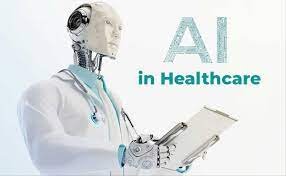AI in Healthcare: Revolutionizing Diagnosis and Treatment

Introduction:
Artificial Intelligence (AI) is revolutionizing the healthcare industry in unprecedented ways. From enhancing medical imaging and accelerating drug discovery to crafting personalized treatment plans and enabling telemedicine, AI is reshaping the future of healthcare. In this article, we delve into the remarkable impact AI is making on healthcare, shedding light on the potential benefits and challenges it brings to the table.
AI in Medical Imaging:
One of the most notable advancements in healthcare is the integration of AI into medical imaging. AI-powered algorithms can analyze vast datasets of medical images, such as X-rays, MRIs, and CT scans, with remarkable accuracy. By swiftly identifying anomalies and assisting radiologists, AI not only speeds up the diagnostic process but also reduces the likelihood of human error. Early detection of diseases, including cancer, has become more achievable, leading to improved patient outcomes.
AI in Drug Discovery:
AI is also playing a pivotal role in drug discovery. It can analyze complex biological data to identify potential drug candidates more efficiently. By rapidly sifting through massive datasets and predicting molecular interactions, AI significantly reduces the time and cost associated with bringing new medications to market. This acceleration is crucial in addressing pressing healthcare challenges, including pandemics and rare diseases.
Personalized Treatment Plans:
Personalized medicine is becoming increasingly achievable thanks to AI. By analyzing a patient’s genetic makeup, medical history, and lifestyle factors, AI can create tailored treatment plans. This approach minimizes adverse reactions to medications and optimizes therapeutic outcomes. Physicians can now prescribe treatments with a higher likelihood of success, improving patient well-being while reducing unnecessary healthcare expenses.
Telemedicine and Remote Monitoring:
The COVID-19 pandemic accelerated the adoption of telemedicine, and AI has played a significant role in this transformation. AI-driven chatbots and virtual assistants can provide initial assessments, schedule appointments, and offer medical advice remotely. Additionally, wearable devices equipped with AI can monitor patients’ vital signs and transmit data to healthcare providers in real-time. This advancement enhances healthcare accessibility, particularly in remote or underserved areas.
Conclusion:
In conclusion, AI is ushering in a new era in healthcare by enhancing diagnosis and treatment. Its applications in medical imaging, drug discovery, personalized treatment plans, and telemedicine are breaking down barriers and improving patient care. However, challenges remain, including data privacy concerns and the need for regulatory frameworks. To fully harness AI’s potential, the healthcare industry must strike a balance between innovation and ethical responsibility. As AI continues to evolve, it promises to make healthcare more efficient, effective, and accessible for all.
